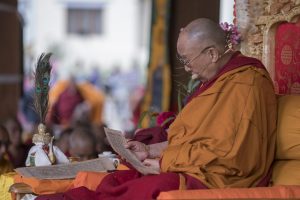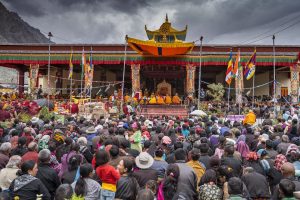
On the second day of teaching in Nubra
Photo: Tenzin Choejor/OHHDL
Thousands of people from around the world gathered in Ladakh for His Holiness the Dalai Lama’s four-day series of public teachings beginning on July 11.
The first teachings were held at Disket Monastery in the Nubra Valley and were based on the middle volume of Kamalashila’s The Stages of Meditation and Gyalsey Thokme Sangpo’s Thirty-Seven Practices of a Bodhisattva.
The values of love and compassion over anger and fear were discussed, emphasising the part that all major religions should play in promoting the practice of compassion. His Holiness read the initial sections of The Stages of Meditation before meeting 300 students from Nubra and 200 monks and nuns who had participated in the Great Summer Debate. He encouraged the young people to work towards a more peaceful 21st century and stressed the importance of considering the welfare of humanity as a whole in order to achieve this vision.
On day two, the Nubra community made a Long Life Offering to His Holiness, and His Holiness gave the permission to practice Avalokiteshvara Who Liberates Beings from All Unfortunate Rebirths. “Each time you receive this permission” he explained, “it eliminates one rebirth in the lower realms”. The permission was a prelude to Mitrayogi’s Three Essential Points, which were taught the following day at Disket Phodrang.
After continued teachings from Thirty-Seven Practices of a Bodhisattva and the bestowment of a White Tara Long Life Empowerment, His Holiness addressed nearly 100 foreigners, whom he greeted as family, and shared his vision for the world saying, “I’m committed to promoting the oneness of humanity. As a Buddhist monk I feel it’s important to encourage inter-religious harmony as it flourishes here in India. All religions convey a common message of love and compassion”.

Photo: Tenzin Choejor /OHHDL
A packed audience of an estimated 6,000 people awaited His Holiness at Samstanling Monastery on the fourth day. The teaching was based on Je Tsongkhapa’s In Praise of Dependent Origination, which His Holiness referred to as “a text that bears the blessings of the hard work Tsongkhapa put into understanding emptiness”.
To conclude his final teaching in the Nubra Valley, His Holiness addressed the audience, “Understanding of emptiness alone will not lead you to Buddhahood, you also need Bodhichitta. If you have a warm heart and you care for others you’ll be happy and the community in which you live will be happier too. See you next time”.




 Print
Print Email
Email